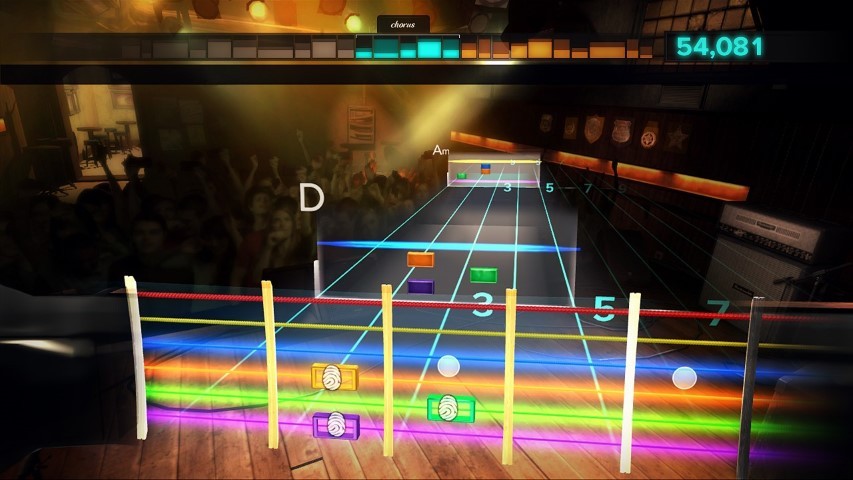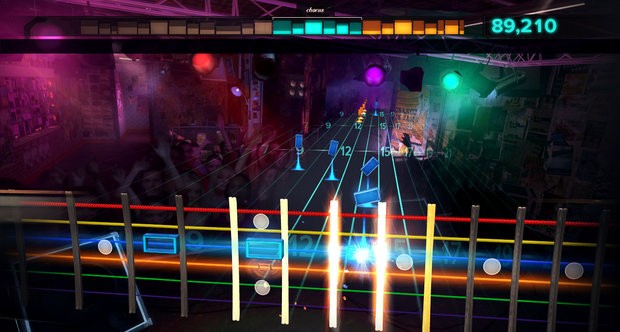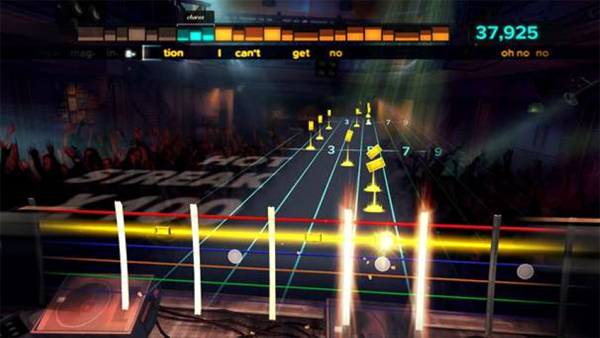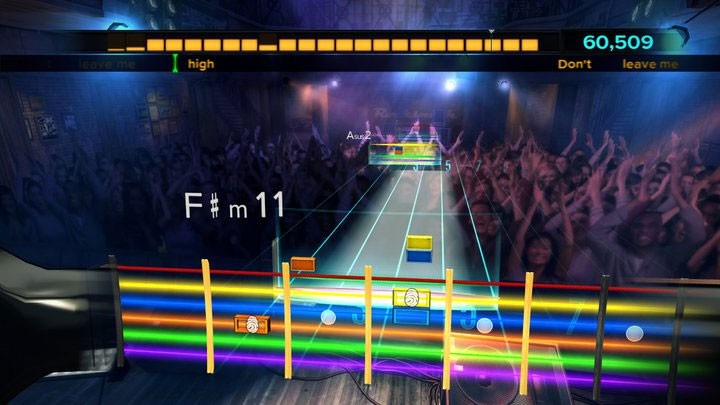|
Rocksmith

Rocksmith is what many
have been waiting for since Guitar Hero exploded on to the scene a few
years ago. Yes, it was great to grab a plastic guitar and jam with
friends, but in the back of everyone’s mind the thought lingered –
“Wouldn’t it be awesome if I could do this with a real guitar?”. Well
Ubisoft has made that thought a reality, and created a marvelous
learning tool along with it.

Setting up is simple, the cord provided connects any
electric guitar in to the PS3 and from there the game just needs to be
booted up. Once started, a soothing voice will guide you through the
first steps. The game lets you choose between guitar and bass, checks
which hand you strum with, and even helps tune the guitar. Once the
guitar is calibrated it is straight on to the songs. Mercifully, unlike
Guitar Hero, all the songs listed are available to play straight away if
preferred. If you choose to go with the games career mode, Rocksmith
will gradually introduce new songs. Once they are mastered an
opportunity to perform in front of an audience presents itself. If the
guitar is played well enough, there is a chance to do an encore with an
entirely new song. Once you have progressed you move on to the next
songs, gradually drawing bigger crowds and nicer venues. There isn’t a
spectacular amount of meat to the career mode, but this doesn’t matter
in the slightest, as the actual gameplay is robust and full of options.

Rocksmith’s presentation is fairly similar to Guitar
Hero’s, just a little more complex because of the increased
interactivity. A guitar neck is displayed and notes travel down it on
certain areas of the fret board. Once the note hits the end you have to
play it. The strings are colour coded to diminish confusion. It will
take a few turns to get used to, as not all the frets are numbered and
the colours need to be memorized, but the system works, and it works
well. The presentation isn’t as cartoonish or extravagant as the other
rhythm games available, but this is probably for the best, as you will
need to concentrate when playing. The songs work on a sliding difficulty
scale, and are geared at amateurs. When first playing, the game will
only present you with a few notes to play at a time to get used to the
song. As you get better at the song, Rocksmith recognizes this and
begins to throw in more challenges. The great thing about this is that
you genuinely see yourself getting better the more you play. After a few
rounds of ‘Slow Hands’ by Interpol, Rocksmith was throwing more
challenges at me and I was starting to respond, my hand was moving up
the fret board of my guitar easier, and I was having little to no
trouble moving between the strings. It may be frustrating for seasoned
players as the difficulty can not be manually adjusted, but as a way of
teaching beginners its approach is very user friendly.

Once outside the career mode there is an even deeper
wealth of options available to help you learn. The songs have different
arrangements based on the way you want to tackle them. The single string
mode focuses on plucking notes, the chord mode will focus solely on
chords, and the combo mode will fuse the two together until you can play
the song the way it was meant to be played. In addition to this there
are various ways to learn the songs within these choices. Feel like
practicing one specific part of a song that you really like? Then go
into the Riff Repeater. Here you can isolate that one part of the song,
and gradually build yourself up until you have mastered it. There are
three different methods for this, the first will freeze every time the
wrong note is plucked, waiting for you to find the correct note before
moving on. The second will start the song very slow, and gradually build
up speed as you hit the correct notes. The last will start with the most
basic arrangement of the riff, and every time you complete it
successfully it will level you up, and add difficulty. If you fail, you
get to try again. If you continue to succeed you will eventually hit
100%, being able to play the whole riff at full speed. It is a clever
way of breaking down songs in to manageable segments and making even the
most complicated of guitar riffs seem achievable.

In addition to the songs, there are a variety of mini
games and technique challenges to be unlocked during the course of the
game. The mini games play like old school arcade games, from shooting
ducks by plucking strings, to hitting baseballs by bending the right
note at the right time. These are good challenges to get your skill
level up, and serve as a welcome distraction if frustration at repeating
a song endlessly starts to creep in. Technique challenges involve
teaching the players various techniques, from power chords to hammer ons.
The guiding voice will explain the technique, accompanied by a video,
and then give you a chance to practice, before making you play a certain
section of a song which features the technique chosen. There is also a
chord library mapped out to each song, so if you are having trouble with
one specific chord, you can work on it first by playing the individual
notes, and then practicing strumming the chord.
Outside of the game modes there are a wide variety of
amps and pedals to unlock that can be used on songs for a different
sound. There is plenty to experiment with once you get better at
playing, or even just to mess around with.

There are some minor issues with Rocksmith, but they
will not get in the way of enjoying the game. The first has to do with
audio setup. The developers recommend using component cables for your TV
audio, or for the best performance to plug in composite cables through a
sound system. If using a HD TV, which is fairly standard these days,
there may be some lag between playing the notes and the game registering
them. I haven’t noticed the problem too much when the TV is switched on
game mode, but for optimal performance you might have to shell out a bit
more, and the game is already pricey if you don’t own an electric
guitar. The other issue is that despite all its technological
innovations, there isn’t much actual ‘game’ to Rocksmith. As a method of
learning guitar it is unique and well put together. As a game it lacks
the visual flourishes of its predecessors, and due to its very nature,
it isn’t the sort of game you can invite friends round to spend the
night playing. However the sense of joy from finally mastering a real
riff on a real guitar more than makes up for that.
What is truly intuitive about Rocksmith is the fact
that it works, let alone the fact that it works so well. Once the guitar
is plugged in the learning begins, and there is a lot on offer in
Rocksmith. Being able to use your Playstation to teach yourself an
actual skill is a rare thing, and Rocksmith should be praised for the
great leap it has taken in rhythm gaming. It has a wide range of
informative guides and methods of teaching you how to play guitar. Apart
from that it is also incredibly fun to play, and your hands will
eventually begin to hurt after many hours of promising “just one more
song..”. There may be some small areas to improve upon, but what
Ubisoft has done here deserves to be commended. |